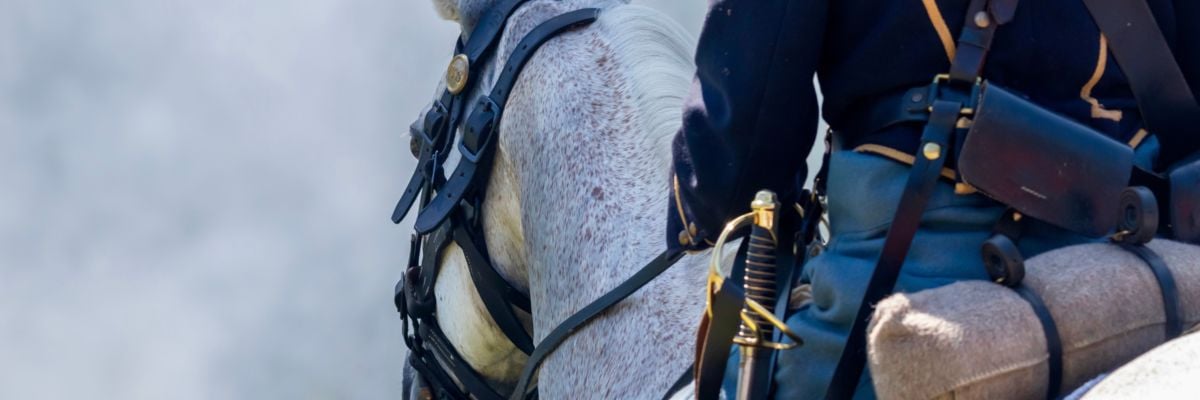
William Starke Rosecrans (1819-1898) would become one of the most famous generals of the Civil War. He also was a single-minded and zealous booster of the Catholic faith.
Rosecrans’s father, Crandall Rosecrans, a veteran of the War of 1812 and a descendant of Dutch-Scandinavian immigrants to the New World, baptized William in the Episcopal faith. He studied and graduated from West Point, a bastion of American Protestantism, where he subsequently taught engineering. He was, in other words, an unlikely candidate to become one of the most important nineteenth-century American converts to Catholicism.
It was while teaching at West Point in the 1840s that Rosecrans converted to Catholicism. One of his daughters, Anita, later claimed he bought a book on Catholicism because he figured that if he was going to take the time to learn about various religious traditions, he might as well add Catholicism to the mix. After an intense period of study, he was conditionally baptized a Catholic in 1844, because of a lack of confidence in the validity of his Episcopal baptism.
Rosecrans initially concealed his conversion from his friends in the army, but it didn’t take long for him to seek to impress his newfound Catholic faith upon everyone around him. He persuaded his wife Ann to convert, which she did after a vision of hell following a difficult pregnancy in 1846. His brother Sylvester likewise converted and was ordained a priest in 1852. (Sylvester was later ordained the first bishop of Columbus, Ohio in 1868.) Both of Rosecrans’s parents had deathbed conversions to Catholicism. According to University of Virginia historian William B. Kurtz, “unlike many men of his era content to leave religion to their wives, he played the central role in his family’s faith life.”
Rosecrans was a busy evangelist. He seemed to have inspired the conversion of fellow West Point graduate George Deshon, who would go on to become superior general of the Paulist Fathers. In the 1840s, he founded a Confraternity of the Sacred Heart for fellow military officers. In 1853, Cardinal Giacomo Fransoni, prefect of the Sacred Congregation for the Propagation of the Faith, awarded Rosecrans with a gold medal and lauded his “singular zeal in performing the duties of the Catholic faith.” Rosecrans also lectured on his belief that Catholicism and democracy were compatible and was critical of slavery as early as the 1840s.
Though he resigned from the army in 1854 due to failing health, he offered his services to the Union only a few days after the surrender of Fort Sumter. By May of 1861, he had already been promoted to brigadier general. He had early battlefield successes in Western Virginia and was transferred to the western theater in 1862. He was a hero in the press, especially after the Battle of Stones River in Tennessee in 1863, during which he rode back and forth across the front lines to rally the Union troops, his uniform covered in the blood of his killed friend and chief of staff, Col. Julius Garesché. Rosecrans ended his report of the victory this way: “Non nobis Domine! non nobis sed nomini tuo da gloriam” (“Not to us, O Lord, not to us but to you be the glory”).
War did not deter Rosecrans from his conviction to evangelize. According to one biographer, his “most precious possession was his rosary,” which he prayed daily and kept with him in battle. His personal chaplain, Father Patrick Treacy, said Mass for him each morning. He would debate theology with his staff officers late into the evening, including his Methodist chief of staff (and the future twentieth president), James A. Garfield. “He is one of the most devoted religious men I ever knew,” Garfield acknowledged. A chaplain in an Indiana regiment noted that Rosecrans made “Catholicity respected and the name Catholic honorable” in the army. Rosecrans also increasingly came to believe that God had given him as a Union officer a unique opportunity to speed the abolition of slavery, which he called a “beastly system.”
As commander of the Union Army of the Cumberland in 1863, Rosecrans led one of the three most important armies of the war and was the highest ranking Catholic in the Union army. Yet his battlefield successes soon came to an end: on 19 and 20 September, 1863, Rosecrans was defeated by Confederate General Braxton Bragg at the Battle of Chickamauga. He spent the remainder of the war on the sidelines in Missouri—the result, some historians speculate, of not only his failure at Chickamauga, but also tensions stemming from his poor relationship with his superior, Ulysses S. Grant, as well as widespread anti-Catholicism in the military and press.
Rosecrans’s friend Garfield, a political insider, offered his former commanding officer the opportunity to run as Abraham Lincoln’s running mate in the 1864 presidential election. Though Rosecrans responded with cryptically positive interest, he was not selected. At the end of the war, he resigned from the army. In 1868, he accepted a position as U.S. minister to Mexico, and he later served in Congress as a Democrat and as registrar of the U.S. Treasury. He died near Redondo, California in 1898.
What lessons can be learned from the remarkable life of William Starke Rosecrans? Perhaps most saliently, we should not be timid when it comes to evangelizing—Rosecrans was influential in the conversion of many family and friends, including his West Point roommate and the later Confederate general James Longstreet, who himself converted to Catholicism in 1877. It is also impossible to calculate the effect of Rosecrans’s public witness as a brave and virtuous fighter in making the Catholic faith socially acceptable in an American society hostile to the Church.
His life also shows that if we are willing, we can be participants in sowing seeds whose divine harvest extends far beyond our imagination. Would Rosecrans ever have guessed his brother would be a bishop, or another friend the founder of a religious order? According to author Geoffrey Perret, Rosecrans also had a son in the priesthood and a daughter in a convent. That is quite a spiritual heritage for the descendent of prominent American Protestants!
Finally, we should also be aware of our own weaknesses. Rosecrans, historians have observed, exhibited a nervous hyperactivity, both on and off the battlefield. That’s perhaps unsurprising for a man who seemed to approach everything he did with boundless energy and zeal. Yet to some degree it was also his undoing: his temperament and willingness to openly question his superiors was likely partly responsible for his deteriorating relationship with Grant, who perceived Rosecrans as insubordinate. Another manic Union general, William T. Sherman, seemed much more adept when it came to his managing relationship with the stoic Grant.
Nevertheless, as many saints’ lives prove, a dogged devotion to the Catholic faith, whatever the consequences, opens before us a clear path to holiness. That’s certainly Rosecrans’s testimony.



